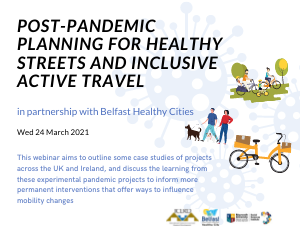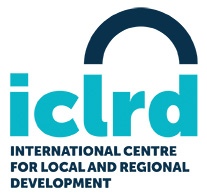ICLRD in partnership with Belfast Healthy Cities hosted by MUSSI present this timely webinar .
Promoting greater walking and cycling has been on the policy agenda for many years now to encourage active travel. However, in reaction to the coronavirus pandemic, and associated lockdowns, many local authorities, and national governments, have fast-tracked statutory guidance to provide space for both exercise and safe, socially distanced travel. The swift redeployment of both financial and human resources to experiment with interventions, and expedite emerging design concepts, that create ‘pop-up’ cycle facilities, encourage walking and outside exercise, and reduce speed limits and closing roads to motor traffic in some neighbourhoods, offer a step-change towards a recovery that is greener, healthier and more inclusive.
This webinar outlines some case studies of projects across the UK and Ireland, and discusses the learning from these experimental pandemic projects to inform more permanent interventions that offer ways to influence mobility changes. In doing so, the discussion provides insights into the future implications for planning, policy makers and politicians in advancing greener, healthier and more inclusive mobility programmes in a post-pandemic world.

Speaker line-up:
Moderator – Dr Gavan Rafferty, Ulster University (5 mins)
Welcome from ICLRD Chair – Ms. Mary MacIntyre OBE
Ms. Cathy Reynolds, Belfast City Council Belfast City Council (10 mins)
Mr. Robert Burns, Dún Laoghaire-Rathdown County Council – (10 mins)
Mr. Graham Grant, Transport Planning, Newcastle City Council (10 mins)
Webinar respondent – Mr. Andrew Grieve Department for Infrastructure Walking and Cycling (5-10mins)
Speaker Info
| Graham Grant Graham is the Assistant Director of Transport for Newcastle City Council and also provides transport policy advice to the North of Tyne Mayoral Combined Authority. Graham leads the Transport Department who determine strategy, secure funding, and then design and deliver schemes or policies. Graham has also led the development of the Tyneside area’s response to the legal direction to improve air quality and to ensuring we embed active and sustainable travel choices in our response to the Covid-19 pandemic. This process, as with other elements of the role, requires ongoing collaboration with other local authorities, and the private sector. |
| Cathy Reynolds Cathy Reynolds is the Director of City Regeneration & Development for Belfast City Council. Cathy is a Chartered Surveyor by profession and has over 25 years’ experience in development, regeneration and strategic asset management. Working with other stakeholders across the public and private sectors Cathy is responsible from a Council perspective for leading on city regeneration and development to drive delivery of physical, social and economic outcomes for Belfast. This includes supporting the physical built environment by ensuring vibrant, inclusive, sustainable, accessible and connected city spaces and places. This includes leading on the Belfast City Centre Regeneration & Investment Strategy and policies, programmes and projects aligned to the regeneration and development of the city. Cathy previously headed up the Asset Management service within Belfast City Council’s Property & Projects Department and led on the delivery of a number of property and development projects and initiatives, working with a range of stakeholders across the public and private sectors. She also had responsibility for the management of the Council’s extensive land and property estate. |
| Robert Burns Robert Burns is a Director of Service and part of the senior management team within Dún Laoghaire Rathdown County Council, with responsibility for the management and delivery of infrastructure and climate action-related projects. He has led on the Council’s response to Covid-19 with mobility interventions and adaptation of the public realm, including village upgrade projects in Blackrock, Dundrum, Dalkey and Glasthule, involving the removal of traffic lanes, enhanced public space and installation of cycling facilities. Robert was also the project manager for the new Coastal Mobility Route, which is a 2-way, 5 km cycle route, between Blackrock and Sandycove, which was built within a 3-month period during Covid. He has a wide interest in the fields of transportation, mobility, town and village renewal and climate action. Robert has a breadth of knowledge and experience across transportation, civil and environmental engineering, with experience in the private, semi-state and public sectors. |
| Andrew Grieve Andrew has been Head of the Active Travel Branch since November 2013. He lives in Belfast and cycles regularly around the city for commuting and everyday journeys clocking up around 2,500 miles annually. His background is in mechanical engineering. Following a short time working in industry and four years in academic research at Queen’s University, Belfast he joined the NI Civil Service in 1989. Over the past 30 years he has held a variety of posts dealing with a broad range of public services. He enjoys his current post in the Active Travel Branch with the challenges that it presents for making a real difference to people’s lives – improving health and wellbeing through more active lifestyles, improving the environment through reduced reliance on motorised transport and bringing the economic and social benefits of more ‘people-centred’ places. |
